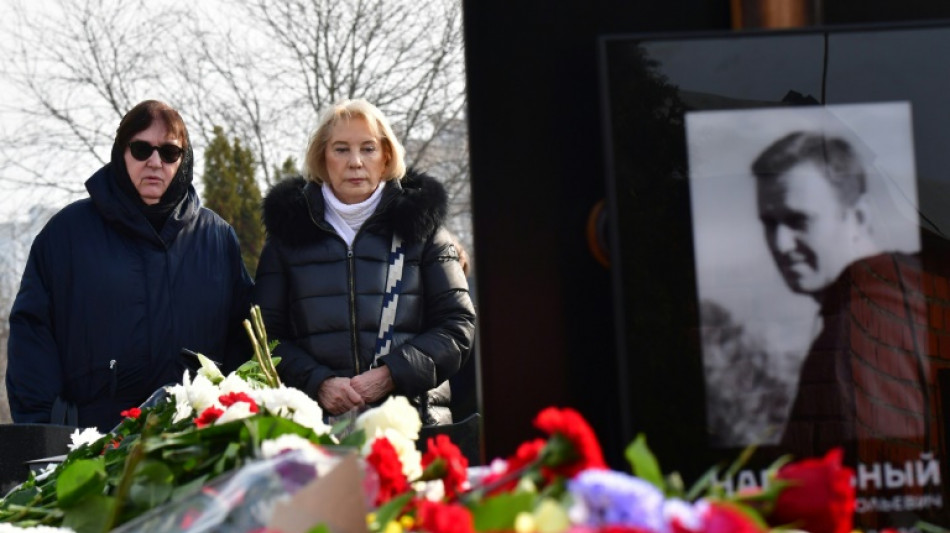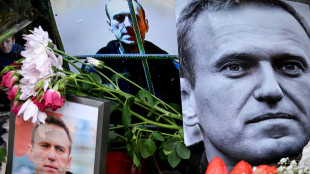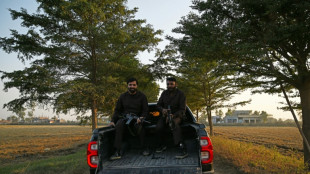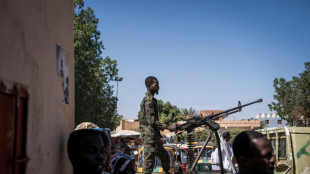
Hundreds of mourners pay tribute at Navalny's grave

Hundreds of Russians visited the grave of dead Russian opposition leader Alexei Navalny on Saturday, risking arrest to pay tribute to the anti-corruption campaigner for a second day running.
Navalny, President Vladimir Putin's fiercest critic for more than a decade, died in an Arctic prison colony last month, where he was serving a 19-year sentence on "extremism" charges largely seen as political retribution for his opposition to the Kremlin.
An AFP journalist saw mourners, some with tears in their eyes, queueing outside the Borisovo cemetery in southern Moscow on Saturday afternoon, as more walked from the nearby metro station carrying flowers and placards in honour of Navalny.
Despite warnings from the Kremlin that they faced arrest, thousands had come out for the official funeral service on Friday.
Authorities have erected airport-style security scanners at the entrance to the cemetery, and police on Saturday were filmed frisking and searching those who had come to pay homage to the Kremlin critic.
Officers ordered mourners to "keep moving" as they laid stacks of red and white roses and carnations on Navalny's grave.
Navalny's mother, Lyudmila Navalnaya, was among those who visited on Saturday, accompanied by Alla Abrosimova, the mother of Navalny's widow, Yulia Navalnaya.
- 'Grief, despair and hope' -
The circumstances of Navalny's death remain somewhat unclear. Authorities said he had died of "natural causes" after losing consciousness following a walk in his Arctic prison colony.
But Navalny's aides have accused the Russian authorities of ordering him killed, and Western leaders have said Putin carries "responsibility" for his death.
AFP journalists saw a continued police presence on Saturday at the cemetery, close to the banks of the Moskva river in the south of the capital.
Some supporters laid placards with Navalny slogans and others brought mementos -- including a yellow rubber duck, a symbol of a major Navalny investigation into alleged corruption of former President and long-time Putin ally Dmitry Medvedev.
Natalia, a 50-year-old artist who declined to give her surname, told AFP she felt "grief, despair and hope", on Saturday
"After all, Alexei asked us not to despair, and fight," she said at the cemetery.
Another mourner, Vadim, 52, said he felt "sorrow and bitterness at the loss of a worthy man of our time".
He urged Navalny's supporters to follow the Kremlin critic's example "and continue to live the way Alexei would have wanted -- to make people in our country and around the world live more happily".
Others found it harder to be optimistic.
"It's sad. And it's just clear that everything that was built with him over the years has also been buried here. That's it," said 29-year-old IT worker Roman.
- Threat of arrest -
Thousands of Navalny's followers had queued for hours to pay their respects to the 47-year-old on Friday.
As they streamed from a nearby church to the cemetery, some chanted "No to war!" and other pro-Navalny slogans, including branding Putin a "murderer" and calling for the release of political prisoners.
Kremlin Spokesman Dmitry Peskov had on Friday said that anybody who appeared to be taking part in an "unsanctioned" rally would be detained.
Rights monitoring group OVD-Info said Russian police had on Friday arrested at least 128 people attending tributes to Navalny in 19 cities.
Police had previously arrested hundreds who came to lay flowers at makeshift tributes that popped up in major cities across Russia after he died.
His wife, Yulia Navalnaya, the couple's two children and Navalny's brother all live abroad and did not attend the funeral, where they could have been arrested for their own opposition to Putin.
Most of his closest aides -- in jail or in exile -- were also unable to attend the service in the Maryino district of Moscow, where Navalny used to live.
Yulia Navalnaya has pledged to continue her husband's work and said Putin "murdered" him.
The scenes of thousands marching in support of Navalny, demanding an end to Russia's offensive in Ukraine and blasting the Kremlin, had not been seen in Russia since February 2022, in the first days after Moscow ordered hundreds of thousands of troops across the border into Ukraine.
The Kremlin has cracked down hard on dissent and has used strict military censorship laws to prosecute hundreds who have spoken out publicly against the military campaign.
O. Karlsson--BTZ

 London
London

 Manchester
Manchester
 Glasgow
Glasgow
 Dublin
Dublin
 Belfast
Belfast
 Washington
Washington
 Denver
Denver
 Atlanta
Atlanta
 Dallas
Dallas
 Houston Texas
Houston Texas
 New Orleans
New Orleans
 El Paso
El Paso
 Phoenix
Phoenix
 Los Angeles
Los Angeles



